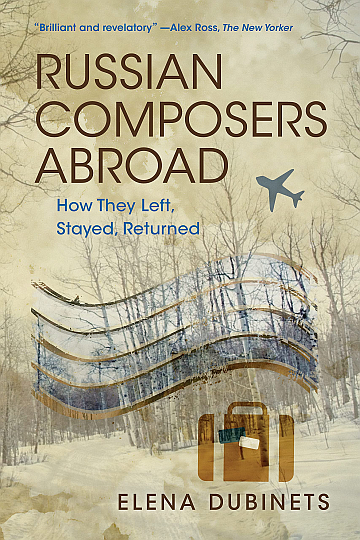Author: Elena Dubinets
Publisher: Indiana University Press
Publication date: October 2021
Available formats:
hardcover (ISBN: 9780253057778)
paperback (ISBN: 9780253057785)
e-book (ISBN: 9780253057808)
Length: 388 pages
Giorgio Koukl | 8 SEP 2022
This weighty 388-page-long musicological work by Elena Dubinets is clearly a work of love.
Love for her own country of origin, love for the music, and last but not least, love for the achievements that many of the composers Ms. Dubinets has known personally have reached.
The book is divided into different chapters addressing aspects of musical life in what was once the Soviet Union. These are treated with great knowledge and detailed explanatory notes and interpolated with what the author calls a “musical interlude”: a chosen work from a composer, analyzed in depth, with multiple explicatory score examples.
First of all, a long preface and introduction attempt to bring the book in context with the more recent dramatic political and military evolution of the last decade. It does so with great elegance and well-founded knowledge.
Ms. Dubinets, who is currently Artistic Director of the London Philharmonic Orchestra, needs little introduction, as her professional story has naturally brought her in contact with many Russian composers. She speaks about musical personalities in flesh and blood, sometimes giving even some delicious personal details, a point in favor of what is otherwise a musicological essay that could easily become academic.
The great difficulty encountered right away is the exact definition of what could be considered “Russian” or “Soviet.” Is it a mere geographical condition, or is there something more involved, like education, musical activity, or even something more difficult to define, called “Russian spirit”?
There certainly could be endless discussions of where exactly the boundaries should be placed when treating a phenomenon that per se has no boundaries.
In any case, Ms. Dubinets arrives at a satisfactory description of precisely what she intended while choosing her examples.
This book’s primary goal is to treat recent waves of emigration, certainly with some due examples of historical figures like Rachmaninoff, Stravinsky, or Prokofiev, but mainly concentrating on lesser-known figures, distributed in what the author indicates as five main emigration moments.
There is even a brief chapter about people who actually fled INTO the Soviet Union instead of OUT OF it. The most known example is the Polish composer Mieczyslaw Weinberg, but there are others.
Elena Dubinets follows the history, fate, and success of many composers, their initial struggle to adapt to a new and mostly-unknown ambiente. She does so in a sincere and partly hard way, describing the noble but also selfish aspects of each of her subjects. This is her main quality, and she never romanticizes her composers.
She also brilliantly describes life in emigration, where for most of the composers an old world is closed, but the new world never really fully opens.
The words of the well-known Czech writer Franz Kafka, which she cites, are quite clear: “You are not from the Castle, you are not from the village, you are nothing.”
The names of composers she has chosen range from the known ones like Alexander Raskatov, Nikolaj Korndorf, or Andrej Volkonsky, to completely unknown personalities (at least here in Europe), to the youngest generation which has still not had time to emerge.
Listening to many of their music, do not await the discovery of a new Stravinski or Louriè. That is not the goal of this work; it is the description of the emigration phenomenon that counts here.
Finally, there is also a chapter about the many who have chosen to return to Russia, with everything that means: She brilliantly describes the sense of lost identity, entirely changed surroundings, and even a hostile attitude towards people who left.
Unfortunately, the last chapter of this book is still not written because there certainly will be a new wave of people leaving Russia, maybe, as history teaches us, to return later, continuing an eternal cycle of life. ■
EXTERNAL LINKS:
- Elena Dubinets at LPO: lpo.org.uk/elena-dubinets-artistic-director.html
Giorgio Koukl is a Czech-born pianist/harpsichordist and composer who resides in Lugano, Switzerland. Among his many recordings are the complete solo piano works and complete piano concertos of Bohuslav Martinů on the Naxos label. He has also recorded the piano music of Tansman, Lutosławski, Kapralova, and A. Tcherepnin, amongst others, for the Grand Piano label. Koukl has most recently completed recording a second volume of the complete solo piano music of Polish composer Alfons Szczerbinski.
(photo: Chiara Solari)
RECENT POSTS









.png)